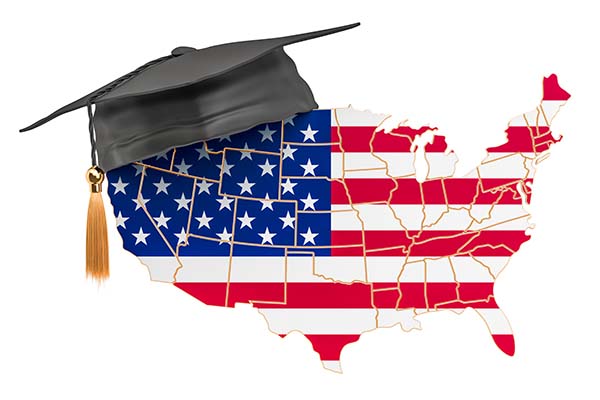Will the Trade War Help Us Win the Education Battle?
If the Trump administration’s tariff-driven trade war regenerates America’s domestic manufacturing base (a big “if” but let’s run with the premise for now), where will we find the people required to run these new factories and supply chains? Even today, manufacturing operations have difficulty finding workers, an issue that may be exacerbated due to immigration caps.
Technological change will have two critically important, related effects. New, on-shored manufacturing plants will likely be modern, requiring fewer workers per unit produced. However, the high-end factory jobs available in these facilities will probably require science, technology, engineering, and mathematics (STEM) skills. Unfortunately, the United States has fallen behind in educating future workers and preparing them for the future.
As I observe in my book The Magic Conveyor Belt: Supply Chains, A.I., and the Future of Work (MIT CTL Media, 2023), “In a world with growing levels of automation and shifting technologies, many workers will need new or upgraded skills in order to retain, regain, or improve their employment.”
The challenge is developing and implementing educational platforms today that meet the demand for talent tomorrow.
Digital Horizons
In The Magic Conveyor Belt, I define digital literacy as a foundational skill that enables people to “navigate various digital platforms and understand, assess, and communicate through them.”
Using smartphones and other electronic devices and navigating various social media platforms introduces people to digitalization, as does automation in today’s workplace. However, as I argue in the book, future jobs will require significantly greater levels of digital dexterity. Seeing data on a smartphone or tablet is one thing, but performing analyses to understand the implications of these data, critically reviewing the results, and taking the proper action in response is entirely another.
Acquiring such skills calls for new approaches to education and training.
Sweeping Changes
Creating innovative learning platforms to provide these skills is a mammoth task that requires reforms across the educational landscape.
There has been a shocking performance deterioration in America’s public schools, which are controlled by trade unions. Beyond this system, religious, magnet, and private schools tend to perform better than their public counterparts. In some parts of the country, notably in red states, money is available to parents who shun public education and want to send their children to private schools. In other areas, teachers’ unions have restricted the allocation of local government funds so that only public schools receive this financial support, effectively limiting parents’ educational choices for their kids.
Degree-level education is also under threat. Falling enrollment numbers, escalating costs, the growing use of AI by students, and political pressures slipping into the classroom are among the issues colleges grapple with.
Teaching methods are also in need of reform. Established institutions are hamstrung by traditional educational models where groups of students assemble in classrooms for in-person instruction. Employees in the dynamic work environments of the future will need educational options that are less costly and much more flexible.
Just-in-time Meets Education
But there is good news too, particularly in the advancement of online education. MOOCS (massive open online courses) are revolutionizing education with their global reach and flexibility, and they continue to evolve.
Consider, for example, the MITx MicroMasters Program in Supply Chain Management, launched a decade ago by the MIT Center for Transportation & Logistics. Open to anyone, anywhere, the program provides a professional, graduate-level foundation in supply chain management. Learners can use the program for free to update their knowledge of supply chain management, or choose to earn a credential by completing five MOOC courses and a final examination for a modest fee. Top graduates can apply to MIT and 36 other universities and, if accepted, complete an on-campus master’s degree in a single semester—a ground-breaking change in higher education.
Even though MicroMasters is a relatively young program, it has achieved 1.2 million enrollments and more than 5,500 credential holders, numbers far beyond traditional programs.
Significantly, platforms like MicroMasters broaden the reach of education both geographically and socially; many learners are experienced professionals juggling career and home life demands who study at their own pace. This type of program is also ideally suited to helping companies update workforce skills, because it adapts quickly to shifting educational demands.
Much of this flexibility comes from the modular structure of online programs. By delivering knowledge in short, modular blocks, often with videos and brief assignments, these programs quickly teach people how to solve specific problems or perform new tasks.
In The Magic Conveyor Belt I call this approach JIT for education.
A Burning Platform
Preparing people for the workplace of the future is an ongoing challenge, unlike President Trump’s trade war, which, by comparison, will be short-lived.
However, today’s tariff-related struggles could serve a useful purpose if they highlight the educational shortcomings we urgently need to address if the US is to rebuild its manufacturing base.
Reform is necessary regardless of the quest to revive American manufacturing. Future US workplaces will look very different from today’s and require new skill sets and educational opportunities.
The lessons are there for all to see, but will our political leaders heed them?
Original post from LinkedIn by Yossi Sheffi: Will the Trade War Help Us Win the Education Battle?
Supply Chain 24/7 Education Resource Center
Find the latest educational resources, degrees, and programs.
Visit: Supply Chain 24/7 Education Resource Center

